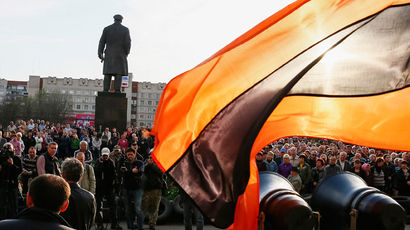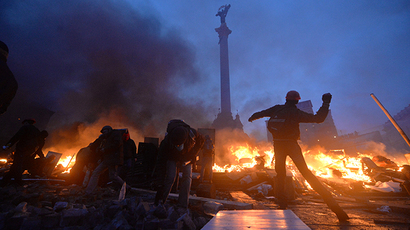Ukraine’s president, opposition agree to a truce
Ukrainian President Viktor Yanukovich and opposition leaders agreed to a truce following a meeting which focused on how to end the crisis in Ukraine peacefully, the president’s press office confirmed.
Follow RT's LIVE UPDATES
"Following the meeting, the parties announced: 1. Truce 2. The start of negotiations to end the bloodshed, to stabilize the situation in the country, for the sake of civil peace,” the press office stated.
The president met with the leader of the nationalist Svoboda opposition party, Oleg Tyagnibok, Batkivshchyna opposition leader Arseniy Yatsenyuk, and UDAR party leader Vitaly Klitschko.
Batkivshchyna opposition party leader Arseniy Yatsenyuk announced the same thing, according to the party's press office. He stressed that the government was planning to declare state of emergency and a night assault on Independence Square, which has now been canceled.
“The planned assault and clearing off protesters is canceled. A truce has been declared and talks will start to stabilize the situation,” Yatsenyuk said.
However the far-right wing of the Ukrainian opposition refuses to observe the truce. The leader of Right Sector said the group did not sign any agreements and called for the continuation of the “offensive of the resurgent people.”

Yanukovich also declared that Thursday be a day of mourning for the victims of the clashes.
US President Barack Obama and and Canadian Prime Minister Stephen Harper reacted cautiously to the news of the truce in Ukraine, stressing that they will continue to monitor the situation closely.
"My hope is at this point that a truce may hold but ... ultimately the government is responsible for making sure that we shift toward some sort of unity government, even if it's temporary, that allows us to move to fair and free elections so that the will of the Ukrainian people can be rightly expressed without the kinds of chaos we've seen on the streets," Obama said.
Meanwhile, the US is implementing visa sanctions against 20 Ukrainian officials, the State Department said, adding that it believes those individuals are responsible for the use of violence. If the visa sanctions are not enough, the US will be ready for further steps in coordination with the EU to stop the violence in Ukraine, Reuters quoted a senior State Department official as saying.
Rebecca Harms, a German MEP for the Greens, told RT that she would be supporting the call for sanctions against Ukraine.
"I have since a long time advocated to go for those sanctions. Because I think it’s really a provocation that some of the political elite in Kiev bring their country back to Moscow and at the same time they are doing big business in European member states with money, which results from several waves of privatizations, so-called privatizations in Ukraine. This must end and this is also something that those brave people fighting for the rule of law and against corruption want us to do," she told RT.

NATO Secretary General Anders Fogh Rasmussen said Ukraine’s relationship with NATO will be seriously damaged if the military intervenes against the protesters, Reuters reported.
"I strongly urge the Ukrainian government to refrain from further violence. If the military intervenes against the opposition, Ukraine's ties with NATO will be seriously damaged," Rasmussen said in a statement.
Earlier, US President Barack Obama threatened the Ukrainian government with “consequences” if the violence continues and the Ukrainian military steps into the conflict, Reuters reported.
Obama condemned the violence in Kiev in the strongest possible terms, saying he believes a peaceful resolution is still possible.
Pentagon spokesman Colonel Steve Warren also said the Ukrainian army’s participation in quelling the riots “would have consequences in our defense relationship.”
“The Department of Defense is encouraged that the Ukrainian armed forces have not been brought into this crisis. We urge them to remain on the sidelines,” he said, adding that US Defense Secretary Chuck Hagel warned his Ukrainian counterpart, Pavlo Lebedyev, of unspecified “consequences” in December.
At least 26 people, including 10 police officers, have been killed and some 800 injured since the start of violent riots in Kiev on Tuesday. The most recent, deadliest wave of violence in Ukraine started with an attempt by radical protesters to storm the building of the Ukrainian parliament (Verkhovna Rada), which prompted fierce clashes with police. Several buildings in central Kiev, including the office of the Party of Regions, were stormed, looted, and set on fire.
Footage from Tuesday’s clashes showed masked rioters firing pistols and rifles from behind the barricades and ramming police cordons with trucks. Reports from the scene claimed that both police officers and rioters were hospitalized with gunshot wounds. The Kiev health department said that 19 of the victims were shot by live ammunition. Dozens more police officers received serious wounds, with officials noting that many of them were shot in the head or neck with “sniper-like precision.”














